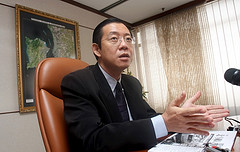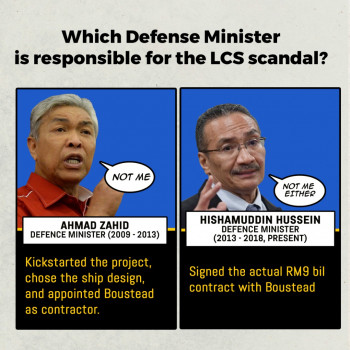by Lim Guan Eng
 Pakatan Rakyat must have struck fear into the hearts of the Barisan Nasional government to the extent that it has been forced to back down from their proposed subsidy cuts and instead announced that there will be no increase in the price of RON95 petrol, diesel and liquefied petroleum gas (LPG) for now.
Pakatan Rakyat must have struck fear into the hearts of the Barisan Nasional government to the extent that it has been forced to back down from their proposed subsidy cuts and instead announced that there will be no increase in the price of RON95 petrol, diesel and liquefied petroleum gas (LPG) for now.
However, diesel subsidies for deep-sea fishing vessels and nine classes of commercial vehicles would still be removed on June 1, slashing RM886.1 million from the federal subsidy burden annually.
There are three reasons why BN “blinked” and decided against proceeding with their proposed price increases.
First, PR was able to mobilize almost total opposition to the price increases by highlighting the gross injustice of big corporate giants such as Independent Power Producers (IPPs) being spared subsidy cuts of RM19 billion annually whilst 27 ordinary Malaysians have to fork out more money for price increases they can ill-afford.
Second, BN intends to hold snap elections and such unfair price increases will not go down well with the voters.
Third, BN is worried about the surprising electoral strength of PR until BN fears pushing through the subsidy cuts will only cause loss of popular support.
However before the people rejoice in celebration at maintaining the prices of such essential items, the BN government has not given up on reducing subsidies to increase prices. This was shown by the statement on May 25 of Deputy Prime Minister Tan Sri Muhyiddin Yassin that subsidy review was necessary as the government expects the subsidy burden to double from RM10.32 billion to RM20.58 billion this year.
Domestic Trade, Cooperatives and Consumerism Minister Datuk Seri Ismail Sabri Yaakob refused to specify how long the government would maintain current prices. In other words, once the snap elections is won by BN, then clearly nothing would stop BN from removing subsidies and allowing prices to increase.
Further the IPPs will once again be spared any gas subsidy reductions as demonstrated by the strong support given to IPPs by both MCA President Datuk Seri Chua Soi Lek and Energy, Green Technology and Water Minister Peter Chin Fah Kui. Peter Chin had insisted that the RM19 billion savings enjoyed by independent power producers(IPPs) and TNB annually is not a subsidy but merely profits forgone by Petronas in selling gas at 25% of market rates. Whilst Chua had declared that gas subsidies to IPPs can not be abolished as it is tied up in agreements.
Peter Chin is playing with words when finally IPPs (60%) and TNB (40%) benefit from the RM19 billion annual subsidy. As for Chua, he should explain why the BN government, including him, supported and tied themselves up with such an agreement that is against national interest of 27 million Malaysians.
There is no way that the 5.4 % fiscal deficit target can be achieved without further subsidy reductions unless the BN government adopts an anti-corruption policy. BN Ministers has admitted that corruption costs the country at least RM 28 billion annually with some estimates at USD100 billion cumulative losses from corruption since 1980s.
An anti-corruption policy is unlikely when the BN government refuses to adopt open tenders, transparent procedures and full public accountability in government procurement and contracts. For this reason, only by supporting anti-corruption PR can the people “kill two birds with one stone” by not only stopping corrupt practices but also stopping price increases.
Soak the poor to enrich big companies
Desperate tactics by BN to racialise PR’s opposition to price increases will not succeed in deceiving and distracting the people that subsidy cuts affect 27 million ordinary Malaysians but not impact the big companies like the IPPs and Felda corporation.
BN is so desperate to justify its subsidy cuts that Domestic Trade, Cooperative and Consumerism Deputy Minister Datuk Tan Lian Hoe is accusing DAP of trying to spark a a racial issue over a cut in the sugar subsidy by involving Felda. This is a stupid argument by Tan as those affected by the price increase of sugar by 20 cents to RM2.30 per kg includes Malays.
Or is Tan saying that price increases in sugar and petrol affect only non-Malays?
I have exposed the profits earned by Felda in the sugar business that was revealed during the listing of its subsidiary, MSM Malaysia Holdings Bhd. MSM produces close to 60 % of the refined sugar production in Malaysia and is valued at RM2.46bil or RM3.50 a share at by CIMB Investment Bank Bhd. For 2010, MSM made a profit of RM 232 million before the sugar price was increased by 20 cents to RM2.30 per kg.
This profit of RM232 million should be sufficient to cover any savings in sugar subsidies’ cuts by the government following the increase in sugar prices. Domestic Trade, Cooperatives and Consumerism Ministry secretary-general Datuk Mohd Zain Mohd Dom had announced that the sugar price increase was to reduce government sugar subsidy by RM116.6 million from RM400 million per year.
What is RM 116.6 million savings from subsidy cuts in sugar by 20 cents compared to RM 232 million in profits earned by MSM last year? The BN government can easily transfer this M116.6 million cost, which is only half of the RM232 million annual profits, to MSM since it is owned by Felda.
Instead, in line with BN’s misguided and corporate-centric policy of helping the rich companies at the expense of poor ordinary Malaysians, BN has chosen to hit the pockets of 27 million Malaysians first than the already huge profits of corporate giants such as Felda or MSM. MSM should be asked to contribute by transferring half of their profits to the government and allow the sugar price to be maintained at RM2.10 per kg.
How can DAP be playing racial politics for asking the Federal government to get Felda to use half its profits to “subsidise” the government as a form of social corporate responsibility that will also help Malays? This is typical of BN’s racial politics that tries to pit Malays and non-Malays in a classic case of divide and rule.
All ordinary Malays and non-Malays are equally affected by the price increases. And all rich Malays and non-Malays equally benefit from not having to suffer any subsidy cuts as that suffered by ordinary Malaysians, especially those benefits enjoyed by the Independent Power Producers.
Clearly BN and Tan have run out of ideas by not been able to explain why no action has been taken to reduce gas subsidies of RM 19 billion annually to Independent Power Producers(IPPs), when it can take action to reduce diesel and gas subsidies of a few hundred million ringgit that hurts ordinary Malaysians.
A more just and fair socio-economic policy should be to cut the subsidies of the rich first instead of the poor. The failure by BN to do so clearly shows that BN is about Barang Naik instead of PR (Price Reductions).



